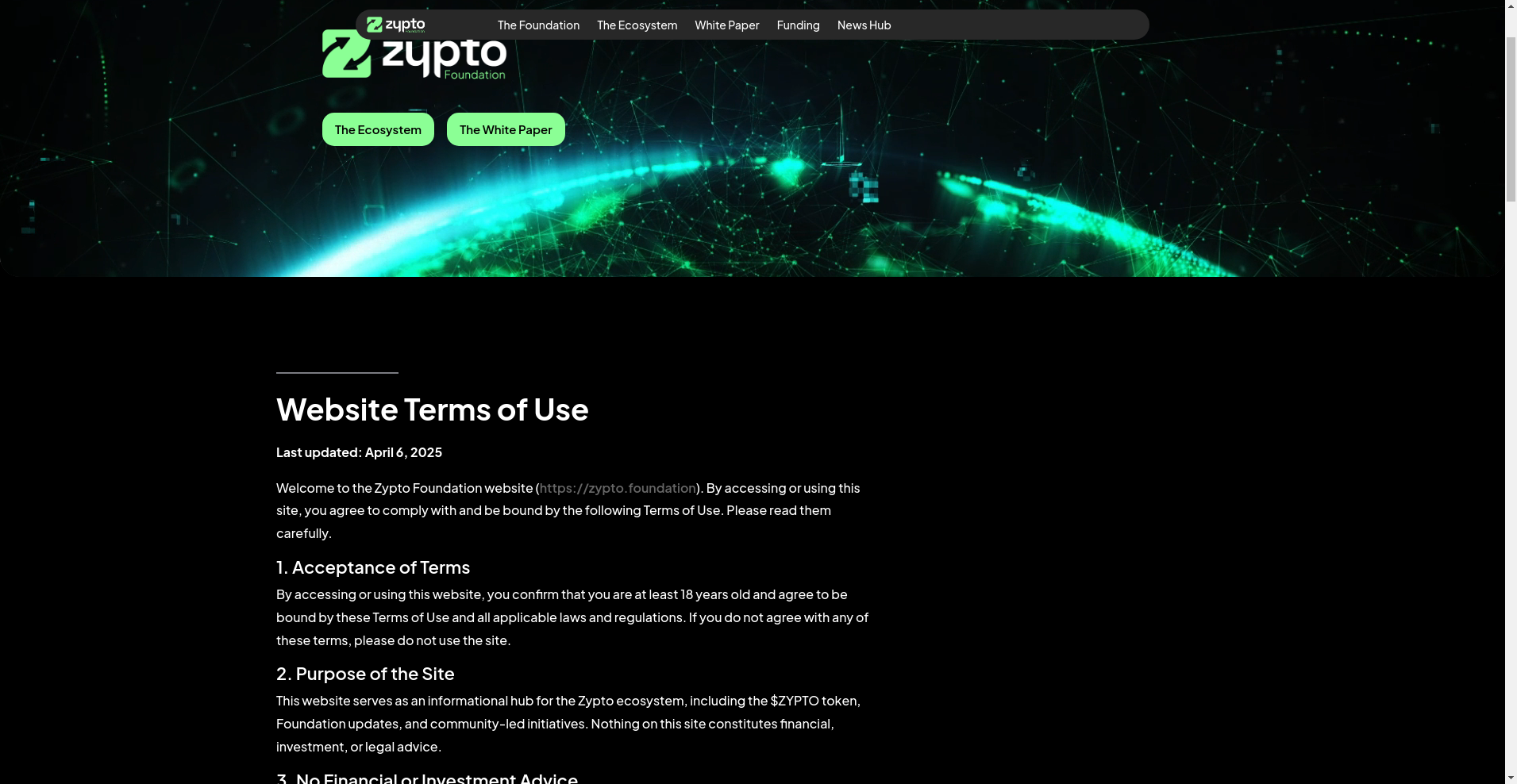ZyptoToken ($ZYPT) Review: A Data-Driven Legitimacy and Risk Assessment

Project Overview: An Impartial Look at ZyptoToken’s Core Proposition
Founded as a community-driven ecosystem, ZyptoToken aims to bridge blockchain technology with real-world financial utility. It positions itself as a multi-product platform encompassing digital wallets, crypto payments, and rewards programs, all orchestrated through its native ERC-20 token, $ZYPTO. The project emphasizes decentralization, community governance, and security, supported by its official documentation and a formal registration under the Cayman Islands jurisdiction.
This review seeks to provide an evidence-based and objective evaluation of ZyptoToken’s strengths, vulnerabilities, and long-term potential, grounded solely in the provided data and audit reports. It offers a comprehensive lens for prospective users or investors to assess the project's legitimacy and risk profile.
Team and Roadmap: An Evaluation of Credibility and Trajectory
The foundational team behind ZyptoToken is not explicitly detailed in the supplied sources; there is no mention of publicly known founders or influencers, raising questions about team transparency. The project's stated ambition involves building a community-empowered ecosystem with layered products—wallets, payment tools, governance, and security hardware—suggesting a broad technological scope.
Key milestones from their 2025 roadmap include:
- Q2 2025: Publishing the Foundation White Paper and launching the Foundation referral program.
- Q3 2025: Extending governance, releasing Zyptopedia, and integrating quadratic voting mechanisms.
- Q4 2025: Final integration of quadratic voting, launching community grants, and expanding ecosystem features.
The structured timeline reflects a commitment to improving governance and expanding community engagement, although the actual capacity of the team to meet ambitious milestones remains unverified. The absence of declared team credentials or bypassed transparency may factor into perceived credibility risks.
Security and Trust: Analyzing Audit Results and Technical Soundness
The analysis relies on the available Cyberscope audit report, which confirms that ZyptoToken's contract, located at 0x7A65CB87F596Caf31a4932f074c59c0592bE77D7 on Ethereum, has undergone a formal security assessment. The audit assesses the smart contract for vulnerabilities and code robustness.
Key findings include:
- Audit Status: The project has a recent Cyberscope assessment labeled as "assessments" with no critical security failures reported.
- Security Score: The report indicates a "94.66%" security score, positioning ZyptoToken in the upper tier of audited projects.
- Vulnerabilities: The audit identified at least one "high criticality" issue, but specific vulnerabilities are not elaborated; standard best practices remain essential. Refer to articles on understanding Cyberscope audits for more insights.
- Centralization Indicators: A decentralization score of 80/100 suggests a relatively distributed governance model, but external infrastructure or control points cannot be fully assessed from the available data.
The reliance on a single audit source constrains full security confidence. While high audit scores bolster trust, the absence of independent third-party reviews or open-source code inspection limits a comprehensive security assurance. For an investor or user, this audit indicates a moderate security posture but warrants ongoing scrutiny.
Tokenomics Breakdown: Supply Structure, Utility, and Economic Sustainability
The $ZYPTO token has a maximum supply of 1,000,000,000 tokens, with approximately 10.3% already burnt, transparently viewable on Etherscan. It operates primarily on the Ethereum blockchain as an ERC-20 token. Its tokenomics are designed to support governance, rewards, and community incentives.
Key features include:
- Supply and Burn: Max supply of 1B tokens; ~103 million tokens (10.3%) already burned, reducing circulating supply.
- Transaction Mechanics: Selling incurs a 2% tax (1.5% to Foundation, 0.5% to liquidity pool); buying is tax-free (0%). Community voting can adjust total tax to up to 4%. This model is an example of ERC-20 token taxes.
- Distribution & Allocation: The Foundation is funded through multiple sources, including marketing contributions, referral fees, fees from tokenomics (from sell tax), and donations, distributed via a community-approved model.
- Utility & Incentives: The token underpins governance and access to loyalty programs (ZYPs), with a focus on community engagement and incentivization.
Economically, the model encourages holding and participating via rewards and perks, but its sustainability depends on continuous ecosystem activity, transaction volume, and successful governance. The low buy tax and flexible sell tax provide adaptability but also require prudent community oversight to prevent inflationary pressures.
Community and Ecosystem Activity: Development Progress vs. Branding Hype
Based on the provided summaries, Zypto's ecosystem comprises a suite of practical products aimed at integrating crypto into everyday transactions, including wallets, Visa cards, bill payments, and decentralized finance tools. The presence of active social media channels—Twitter (with ~3,900 followers) and Telegram (~4,400 members)—demonstrates community engagement efforts.
Recent activity highlights include:
- The launch or deprecation of an upgraded website in April 2025, with transparent communications emphasizing platform maturity.
- Security feature showcases such as the Vault Key Card highlight a focus on trust-building and technical security messaging.
While some product launch milestones are detailed (Card programs, DeFi access), the actual deployment readiness and user adoption metrics are not publicly disclosed. The discrepancy between branding hype and verified real-world activity warrants cautious optimism—pending third-party validation and market traction.
Terms and Conditions: Legal Framework and Potential Risks
The project's Terms of Use specify that participation is voluntary, and all content is informational, not financial advice. Their key points include:
- The $ZYPTO token is a community utility, not a security or security-like instrument, with explicit disclaimers about value and volatility risk.
- Participation in governance or rewards is optional, with no guarantee of returns or influence beyond community votes.
- The legal registration in the Cayman Islands (CR-419893) establishes a formal jurisdiction that could impact legal recourse and regulatory scrutiny.
- The site explicitly states that third-party platforms involved (exchanges, audit firms) are external and may carry their own risks. Understanding post-mortem analyses of DeFi projects can help in assessing such risks.
Potential risks include regulatory uncertainty due to jurisdictional registration, market volatility of the token, and reliance on community governance votes with no binding enforcement. No explicit data privacy or investor protection clauses are detailed beyond standard disclaimers.
Final Assessment: The Risks and Rewards of Engaging with ZyptoToken
In sum, ZyptoToken’s ecosystem presents a credible vision of community-powered crypto utility supported by technical audits and transparent tokenomics. The project combines practical product offerings—wallets, security hardware, fiat integrations, and rewards—with a governance framework designed to include and incentivize the community.
However, the lack of detailed team disclosures, reliance on a single audit source, and unverified product deployment stages introduce inherent risks. Its legal domicile in the Cayman Islands, while providing legitimacy, also necessitates further due diligence concerning compliance and jurisdictional protections for investors.
Investors and users should recognize that while Zypto’s strategic framing aligns with best practices—security, transparency, and community engagement—significant uncertainty remains. Continuous monitoring of real-world adoption, independent security reviews, and transparent governance outcomes are essential to better assess its longevity and trustworthiness.
Strengths
- High security audit score (94.66%) with formal assessment
- Transparent token supply with a significant burn, promoting scarcity
- Multi-product platform integrating wallets, fiat, and DeFi tools
- Legal registration in the Cayman Islands
- Community-oriented governance and rewards programs
Risks and Weaknesses
- Limited transparency on the core team’s credentials and background
- Reliance on a single security audit source and no independent third-party validation yet
- Unclear product deployment status, actual user adoption, and real-world usage metrics
- Jurisdictional risks associated with Cayman Islands registration
- Potential for governance influence concentration until more decentralized structures mature
In conclusion, ZyptoToken exhibits promising elements aligned with credible industry standards—yet it warrants ongoing due diligence. The decision to engage or invest should be grounded in verified technical assessments, transparent governance developments, and clear evidence of product-market fit.
